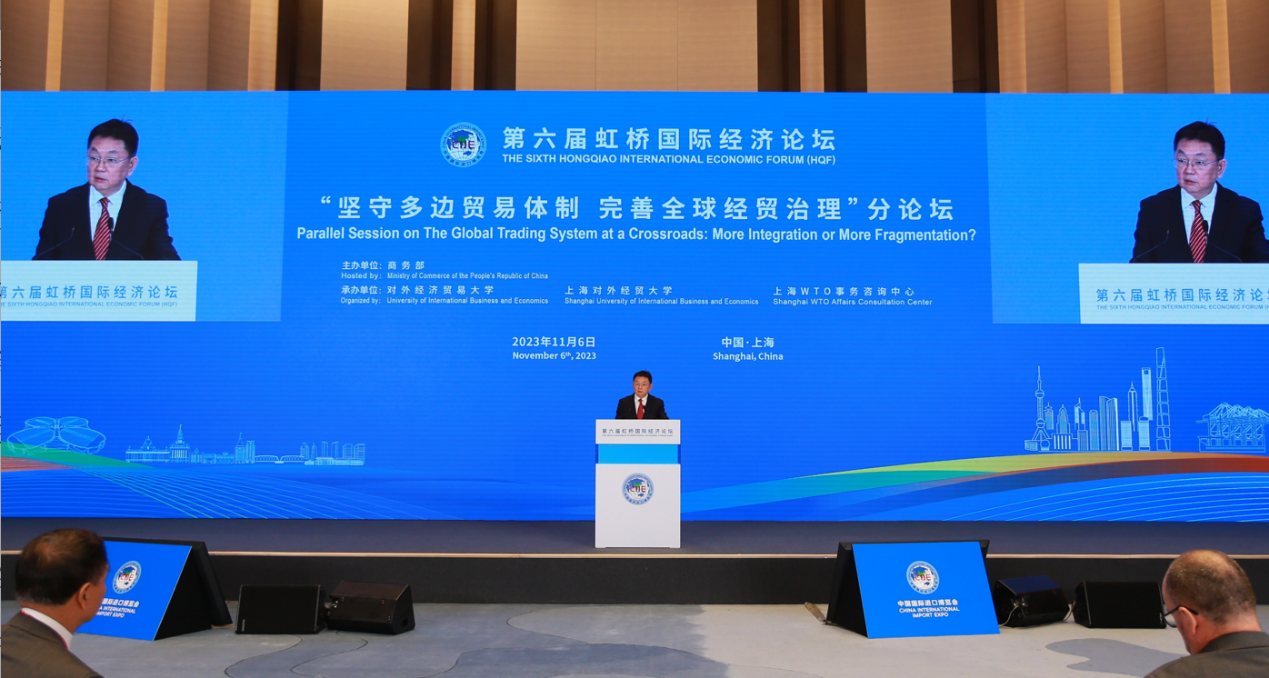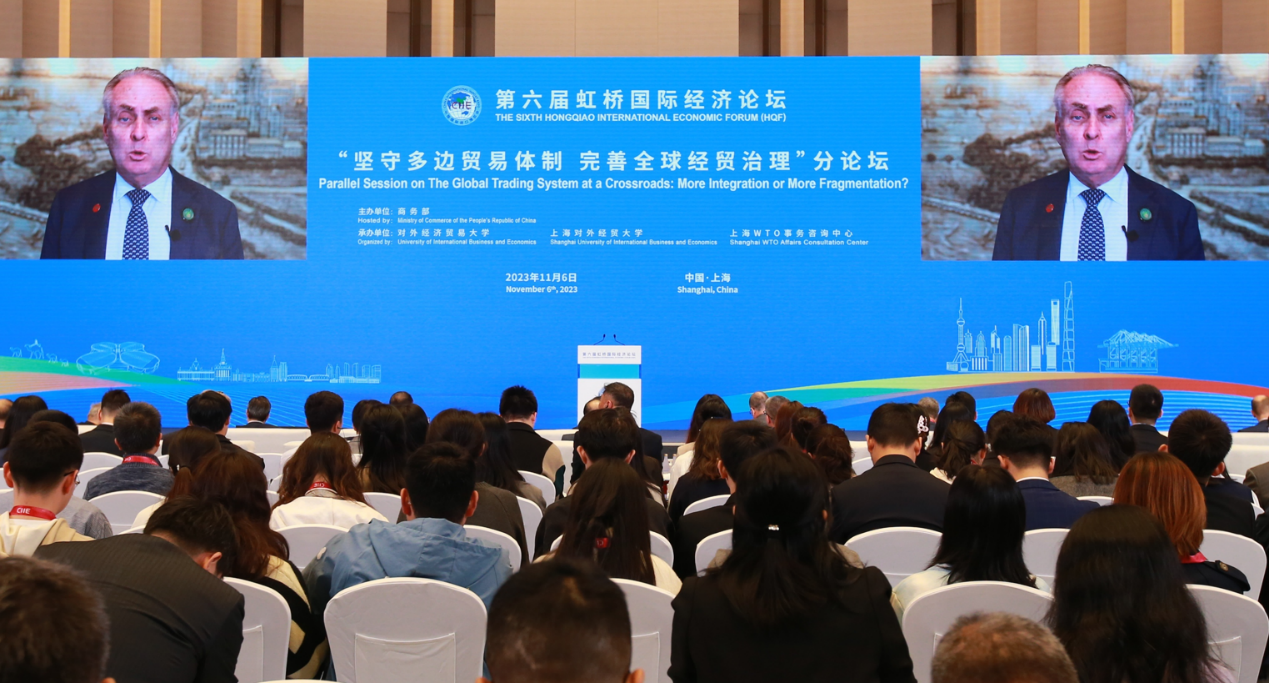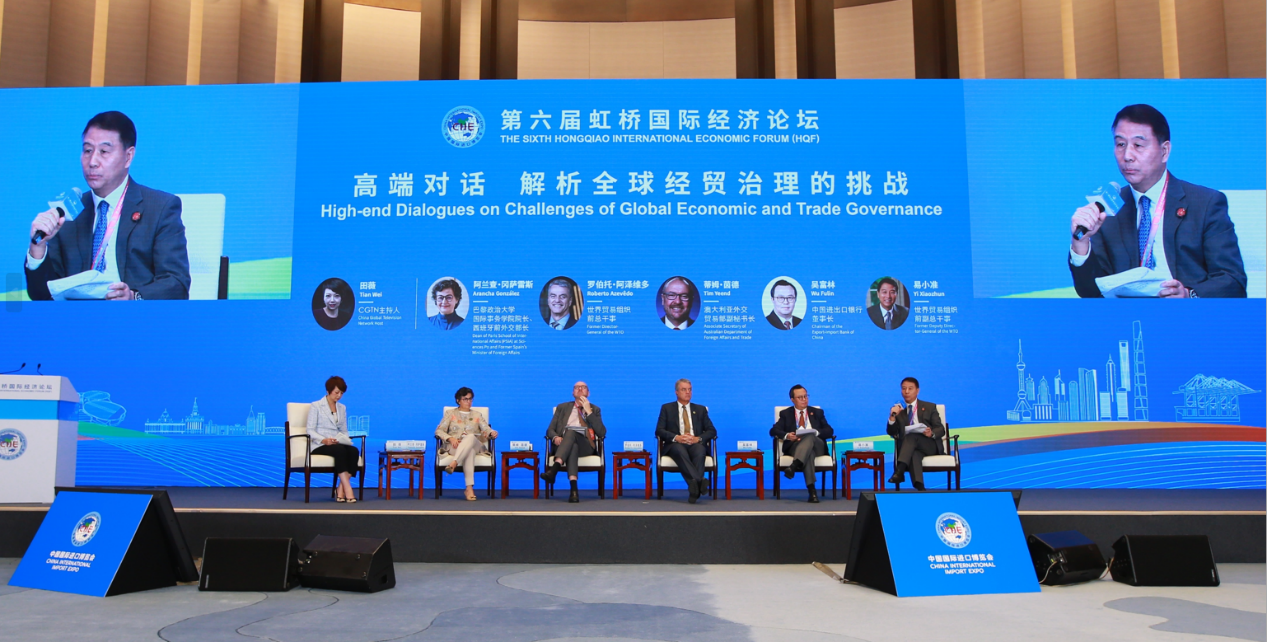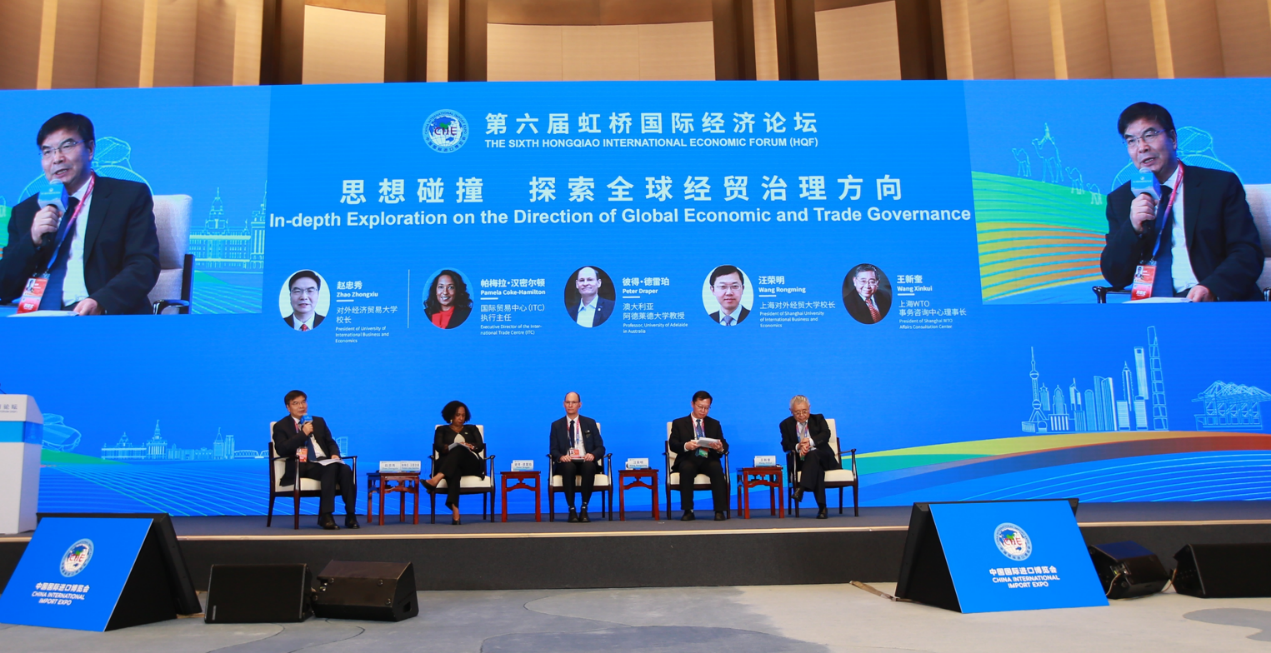The 6th Hongqiao International Economic Forum Parallel session was successfully held in Shanghai
From November 5 to November 10, 2023, the 6th China International Import Expo and Hongqiao International Economic Forum was successfully held in Shanghai. Under attentive and professional guidance of school leaders and the WTO Former Deputy Director-General Yi Xiaozhun, with four-month preparation by the close collaboration between two WTO Chairs in China - China Institute for WTO Studies at University of International Business and Economics and School of Trade Negotiations at Shanghai University of International Business and Economics, in the morning of November 6, Parallel session on the Global Trading system at a crossroads: More integration or more fragmentation? was successfully held at National Exhibition and Convention Center in Shanghai.
This parallel session attracted important domestic and foreign guests, experts and scholars. Guests from government, academia and business conducted in-depth discussions on how to deal with current challenges facing global trade. Ling Ji, Vice Minister of Ministry of Commerce of China, delivered a keynote speech. Don Farrell, Minister for Trade and Tourism and Special Minister of State of Australia, delivered a video speech. Arancha González, Dean of Paris School of International Affairs (PSIA) at Sciences Po, Former Minister of Foreign Affairs of Spain; Roberto Azevêdo, Former Director-General of the WTO; Tim Yeend, Associate Secretary at Department of Foreign Affairs and Trade of Australia; Pamela Coke-Hamilton, Executive Director of the International Trade Centre (ITC); Yi Xiaozhun, Former Deputy Director-General of the WTO; Wu Fulin, Chairman of Export-Import Bank of China; Peter Draper, Professor at University of Adelaide, Australia; Wang Xinkui, President of Shanghai WTO Affairs Consultation Center; Zhao Zhongxiu, President of University of International Business and Economics; Wang Rongming, President of Shanghai University of International Business and Economics; Tian Wei, CGTN’s host and other guests attended the session and had a fruitful discussion.
Ling Ji, Vice Minister of Commerce, stated that since China joined the WTO for more than 20 years, it has always been a staunch supporter of the multilateral trading system and resolutely safeguarded multilateral trade rules with practical actions. China will adhere to true multilateralism, promote the development of world trade with greater openness, take more active actions to participate in the reform of the WTO, promote the improvement of the global economic governance system, and contribute to building a community with a shared future for mankind.

Don Farrell, Minister for Trade and Tourism and Special Minister of State of Australia, pointed out that China-Australia trade relations is an important part of multilateral trading system. China and Australia have many common interests in multilateral trade and have broad cooperation in addressing climate change and realizing a green economy. Australia supports the global multilateral trading system and the dispute settlement mechanism to resume normal operation as soon as possible, and hopes to work together to ensure the success of the 13th Ministerial Conference in Abu Dhabi.

This session was composed of a high-level dialogue, hosted by CGTN’s anchor Ms. Tian Wei. The high-level dialogue session invited guests from political, academic and business fields to discuss the challenges, explorations and directions of global economic and trade governance and other related issues. Arancha González, Dean of Paris School of International Affairs (PSIA) at Sciences Po, Former Minister of Foreign Affairs of Spain, indicated that the biggest challenge facing current global trading system is the spread of the outdated “zero-sum game” thinking. Countries need to embrace the concept of “win-win cooperation” and practice. China and EU have the same goals and need open markets. They have common interests and can work together. Roberto Azevêdo, Former Director-General of the WTO, referred to promoting multilateralism as being in the interest of most members by listing four different scenarios: unilateral, bilateral, regional and multilateral. The multilateral trading system is currently facing challenges. It is hoped that all parties can restore confidence in the multilateral trading system through step-by-step solid actions. Tim Yeend, Associate Secretary at Department of Foreign Affairs and Trade of Australia, believes that global economic uncertainty, geopolitics, energy and food, and climate change all pose challenges to the trading system. Countries need the WTO to play a greater role to create an inclusive and open global trade environment. Wu Fulin, Chairman of Export-Import Bank of China, mentioned that in the face of challenges to global governance structure, the most important response is action. The Export-Import Bank of China helps improve the trade efficiency and trade conditions of enterprises in countries in “Belt and Road Initiative” in terms of financing and credit investment. Yi Xiaozhun, Former Deputy Director-General of the WTO, specified that the economic and trade policies of some developed countries have shifted from traditional free trade to protectionism and unilateralism. They have adopted domestic priority, purchased domestic products, or put forward some local content requirements for investment. Such policies and practices are very inconsistent with the WTO.

The session was also set up with an in-depth exploration on the direction of global economic and trade governance, hosted by Zhao Zhongxiu, President of University of International Business and Economics. Representatives from Chinese and international organizations and academia brought inspiring point views and interacted with the audience. Pamela Coke-Hamilton, Executive Director of the International Trade Centre (ITC), said that the International Trade Centre is committed to build bridges between government and enterprises, helping small and medium-sized enterprises to enter market and seek a place in the international market, helping the voices of small and medium-sized enterprises to be heard by policy makers. Peter Draper, Professor at University of Adelaide, Australia, discussed climate and environmental issues under existing WTO rules framework and at the policy level of various countries, as well as put forward suggestions such as maintaining existing international trade rules and increasing dialogue and exchange opportunities among countries. Wang Rongming, President of Shanghai University of International Business and Economics, pointed out that we should maintain the main channel status of multilateral trading system, prioritize key issues that endanger the survival of the WTO, solve the issue of fairness of rules and respond to the needs of the times, respect the respective development models of members, ensure special and differential treatment for developing members, and effectively enhance the authority and effectiveness of the WTO. Wang Xinkui, President of Shanghai WTO Affairs Consultation Center, believes that global economic governance faces the problems of global economic rebalancing, global economic digital transformation and green transformation. In view of the reform direction of global multilateral trading system, he proposed to insist on taking small steps without stopping, persisting in dialogue, strengthening knowledge, theory, and putting forward talent reserves.
In the morning of November 5, President Zhao Zhongxiu was also invited to attend the opening ceremony of the 6th China International Import Expo. Li Qiang, Premier of China, attended and delivered a keynote speech.
During the sub-forum, Tu Xinquan, Dean of China Institute for WTO Studies, also met and exchanged views with many alumni of institute who are studying for doctoral degrees at Fudan University, Shanghai University of Finance and Economics, and Xiamen University.

